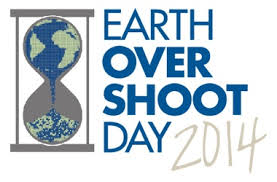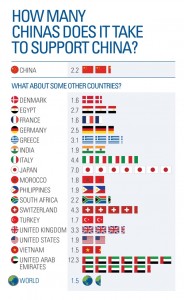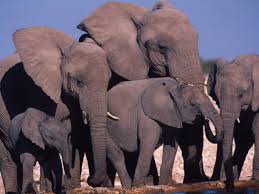Earth Overshoot: Are We Willing to Pay Such a High Price for the “Good Life”?
Aug 19th, 2014 | By admin | Category: Environment/SustainabilityBy Suzanne York, www.howmany.org
Global overshoot. You’d have to be in serious denial, or living under a rock, to not realize that humanity today is living beyond planetary means. We take so much from Earth to live our lives today.August 19th is designated as Earth Overshoot Day, the date humanity exceeds the carrying capacity of the Earth and we begin living beyond our means for the given year. We are all paying a high price for a modern, consuming way of living – regardless of whether you consume a lot or not.
The Brink of Extinction
According to the Global Footprint Network, “Today, 86 percent of the world population lives in countries that demand more from nature than their own ecosystems can renew. According to Global Footprint Network’s calculations, it would take 1.5 Earths to produce the renewable ecological resources necessary to support humanity’s current Footprint. Moderate population, energy and food projections suggest that humanity would require the biocapacity of three planets well before midcentury.”
It’s not a coincidence that a report released this week found that ivory poachers have killed 100,000 African elephants in just three years.
More African elephants are being killed by poachers than are being born each year and some populations may be perilously close to extinction.
“The majority of populations are declining,” said George Wittemyer, assistant professor in the department of fish, wildlife and conservation biology at Colorado State University and one of the authors of the study. He added that 75 per cent of populations in Africa are on the decline, stating “Some we may have lost already, some will take several decades.”
Finding the Means and Will to ChangeIt doesn’t have to be this way. We know what we need to do, but lack of money (or rather, fail to direct it to the right places) and especially lack of political will hinder positive change. This is so true here in the U.S., the wealthiest country in the world that is still stuck in the past. We are rolling back the clock on too many important issues – civil rights/racism, inequity, gender inequality, and reproductive rights. Blindly and ignorantly, we continue with business as usual, damn the consequences.
If we are able to find the will to change, there are a few concepts and approaches that can guide us:
Economic growth – conventional economic wisdom holds that global economic growth can continue forever, yet the reality of resource constraints say otherwise. Rethinking economic structures is needed. There are viable alternatives that offer the opportunity to live within the planet’s means, such as steady-state economics and supporting local economies and alternative economic indicators (i.e., Genuine Progress Indicator).
Invest in Women – empowering women won’t end global overshoot but it will make for a better world. An estimated 222 million women in developing nations would like to be able to plan the spacing and timing of their children but don’t have the education, access, knowledge or cultural permission to use a modern method of family planning. Investing in women goes with a more sustainable environment – when women’s needs are met, they are able to better manage resources, confront the effects of climate change and support healthier communities.
Beyond Conservation – many organizations and individuals work tirelessly to conserve species and the natural world. But the fact of the matter is that most national parks and protected areas are becoming oases in a sea of humanity. Bigger picture thinking is needed. Rights of nature, for example, attempts to change the view of nature as property to be bought, sold and plundered; it offers real hope for protecting the environment. Otherwise, we are just putting band-aids on conservation efforts. These efforts are still greatly needed, but it’s time to think outside the proverbial box.
Changing CourseIf you look around, there are hundreds and thousands of organizations and initiatives addressing systemic change. Yes, the reality is that we are in global overshoot, but we have the ability to change course.
In the words of Margaret Mead, “Never doubt that a small group of thoughtful, committed citizens can change the world; indeed, it’s the only thing that ever has.”
Suzanne York is a senior writer with the Institute for Population Studies.



